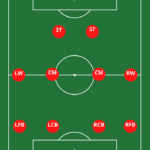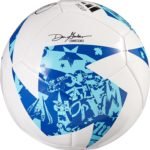- Last Updated -
 Soccer Tips, Lets Get Started
Soccer Tips, Lets Get Started
Soccer is a sport that has become incredibly popular all around the world. It is played in almost every country and brings people together from all walks of life.
Whether you are a seasoned veteran or brand new to the game, there are always ways you can improve your skills on the field. This article will provide you with tips and tricks to help elevate your game.
One of the most important things to focus on when trying to improve your soccer skills is ball control. The ability to control the ball with ease will allow you to make more accurate passes, take better shots, and move around the field with confidence.
In order to develop better ball control, it is important to take as many touches of the ball as possible. Practicing dribbling drills and playing small-sided games can help you get comfortable with handling the ball under pressure.
Another crucial aspect of improving your soccer skills is consistent practice. It can be easy to fall into a routine where you only practice before games or during team training sessions, but if you really want to improve, it’s important to put in extra work outside of those times.
Whether it’s practicing juggling at home or working on specific skills like shooting or passing, consistent training will help you make progress faster. Focusing on basic soccer tactics can also help elevate your game.
Understanding how your position fits into your team’s overall strategy can help you make smarter decisions during games and contribute more effectively as part of a larger unit. Learning about basic tactical concepts like spacing, pressing, and transitioning between offense and defense can give you an edge over opponents who rely solely on individual skill.
Basic Soccer Tips
Regarding playing soccer, there are some basic tips that every player should keep in mind. These tips will help players improve their game and reach their full potential on the field. First and foremost, taking lots of touches of the ball is crucial for any soccer player.
The more you practice controlling the ball with your feet, the better you will become at dribbling, passing, and shooting. Aim to touch the ball as much as possible during each session, including drills to improve your close control skills.
Another essential tip is to practice every day. Consistent practice is key when it comes to improving your soccer skills.
Even if you only have a few minutes each day, make sure to use that time wisely by focusing on specific skills like shooting or passing. Working on the basics is crucial for any soccer player looking to improve their game.
This includes things like footwork and dribbling skills but also involves other aspects such as teamwork and communication. Understanding basic soccer tactics like positioning and passing can also give players an edge on the field.
Overall, mastering these basic soccer tips can help players take their game to the next level. With consistent practice and focus on these fundamental skills, players can improve their performance on both an individual level as well as within a team setting.
And don’t forget about using proper equipment! Good quality gear can help you enhance your performance in training sessions allowing for more effective development of important footballing attributes such as shot power or speed without compromising safety during games or training sessions.
Take Lots of Touches of the Ball
Taking lots of touches of the ball is one of the most important soccer tips for any player, regardless of their position. The more you touch the ball, the more comfortable you’ll feel on it and the better your ball control in soccer will be. When you’re starting out or trying to improve your skills, make sure you’re getting as many touches as possible each day.
One way to get more touches is to simply practice juggling with the ball. Start with a small number, even just five or ten, and try to increase that number each day.
You can use different parts of your body like your feet, thighs, chest or head to juggle and work on different soccer skills at the same time. Juggling might seem easy for some players but it’s actually a great way to improve your coordination and balance while also giving you a lot of control over the ball.
Another way to get more touches is by using a wall. Stand facing a wall and pass or kick the ball against it with one foot and then receive it with another.
This will help you work on both passing accuracy and first-touch control at once – two very important soccer skills in any position! If there’s no wall available you can also use a friend or family member as a “wall” instead.
Overall, taking lots of touches of the ball is crucial if you want to become an excellent soccer player. Whether through juggling practice or using a wall for passing drills, make sure that every day includes plenty of opportunities for you to get comfortable with this key piece of soccer equipment -the ball- so that when game time comes around, your confidence will be sky-high!
Practice Every Day
Practicing every day is one of the most essential things you can do to become a better soccer player. When you practice every day, you give yourself an opportunity to improve your skills and build muscle memory.
This helps you develop the necessary confidence on the field to make quick decisions and execute plays effectively. To maximize your practice time, try breaking it up into different segments so that you can focus on different aspects of your game.
For example, you could spend 20 minutes working on ball control drills, another 20 minutes focusing on passing accuracy, and then dedicate some time towards shooting practice. By varying your training regimen in this way, it will help keep things interesting while also ensuring that all areas of your game get proper attention.
When practicing every day, it’s important to have a plan in place that allows for progression over time. Start with basic exercises and gradually increase their difficulty as you become more comfortable with them.
This will ensure that you’re continuously challenging yourself and pushing the boundaries of your comfort zone when it comes to Soccer Skills. It’s also important not to neglect physical conditioning during your practice sessions.
Make sure to incorporate sprinting drills and other cardio exercises into your routine so that your body is better equipped for the demands of a full 90-minute match. Additionally, regularly reviewing Soccer Tactics with coaches or teammates during practice can help improve team chemistry and understanding of different plays.
Practicing every day is one of the most fundamental building blocks toward becoming a successful soccer player. By incorporating varied training exercises into an effective plan along with a regular review of Soccer Tactics or Soccer Equipment, players can achieve steady progress toward their goals over time.
Work on the Basics
To become a great soccer player, you need to have solid fundamentals. This means that before trying anything too advanced, you should work on the basics.
Here are some tips on how to do that. Firstly, focus on your ball control in soccer.
This means taking a lot of touches of the ball and practicing your dribbling skills. Work on using both feet and controlling the ball in different situations, such as when running at full speed or when under pressure from an opponent.
With practice, you’ll gain more confidence with the ball at your feet. Secondly, practice passing accurately and with purpose.
Passing is one of the most important skills in soccer as it allows you to move the ball around the pitch and create scoring opportunities for your team. Work on both short and long passes, as well as one-touch passes, which can be very effective when executed correctly.
Make sure you work on your shooting technique. Shooting is a crucial part of a striker’s game but it’s also important for midfielders who find themselves in scoring positions.
Practice different types of shots such as volleys and headers as well as using both feet while shooting. Remember: mastering these basic soccer skills takes time and effort so don’t get discouraged if things don’t go perfectly right away!
Keep practicing until these moves become second nature to you. Additionally, make sure that you’re always using proper soccer equipment like cleats or shin guards to protect yourself during training sessions or games.
Advanced Soccer Tips
Once you’ve mastered the basic skills, it’s time to move on to the next level of soccer excellence.
can help you optimize your training and boost your performance on the field. Optimize Your Training: To improve your game, it’s important to tailor your training regimen to your specific needs.
For example, if you’re a striker, focus on shooting drills and positioning exercises. If you’re a defender, practice tackling and blocking shots.
Work with a coach or trainer to create a personalized training program that will help you hone your skills in all areas of the game. Focus on Your First Touch: In advanced soccer play, every second counts.
The first touch is crucial when receiving the ball because it sets up the rest of the play. Practice taking control of the ball without looking down at your feet so that you can make quick decisions about what move to make next.
Understand and Implement Team Tactics: Advanced soccer players also need to understand how their team functions as a whole in order to be successful on the field. This means studying not only individual skills but also soccer tactics such as formations, pressing strategies, and counter-attacks.
Knowing how to work with your teammates is just as important as having excellent ball control skills or powerful shots. By implementing these advanced soccer tips into your training regimen, you can take your game to new heights.
Whether you’re looking to become an elite player or simply want to improve your performance for recreational games, these tips can help elevate both your individual skills and team play strategies. Don’t be afraid to push yourself out of your comfort zone – after all, that’s where true growth happens!
Optimize Your Training
When it comes to soccer, there are many different ways to train. Some players prefer to practice on their own while others prefer to attend soccer camps or work with personal trainers.
Regardless of your preferred method, it’s important to optimize your training in order to get the most out of your time and effort. One key aspect of optimizing your training is setting clear goals.
Whether you’re looking to improve a specific soccer skill or simply become a better all-around player, having a clear goal in mind can help guide your training sessions and keep you motivated. Consider setting both short-term and long-term goals, and track your progress over time.
Another important aspect of optimizing your training is making sure you’re using the right equipment. This includes everything from soccer balls and cleats to cones and agility ladders.
Using high-quality equipment can help you improve your ball control in soccer as well as other essential skills like speed, agility, and endurance. Don’t be afraid to mix things up in your training routine from time to time.
Trying new drills or practicing with different teammates can help keep things fresh and prevent boredom or burnout. By optimizing your training in these ways, you’ll be well on your way towards becoming a top-notch soccer player!
Focus on Your First Touch
One of the most important skills in soccer is having a great first touch. Your first touch can make or break your opportunities on the field, so it’s important to focus on improving it.
There are several ways to enhance your first touch, including practicing different techniques and drills. One way to improve your first touch is by practicing with a wall.
Stand about 5-10 feet away from a wall and pass the ball against it with varying levels of force. As the ball bounces back, try to control it with one touch using different parts of your foot.
This drill will not only help you improve your first touch but also your ball control in general. Another technique for developing a good first touch is by working on receiving passes from teammates during practice.
Communication and timing are key when receiving passes, so make sure you’re calling for the ball and positioning yourself correctly when preparing to receive a pass. Aim to receive each pass with one foot and make sure you’re comfortable using both feet.
It’s also essential to remember that the best players work on their first touch continually, even after achieving proficiency. So don’t get complacent once you’ve improved, but instead continue practicing various techniques every day focusing on speed, accuracy, and control until they become second nature in game situations no matter what position you play or how skilled an opponent happens to be.
Understand and Implement Team Tactics
Understanding and implementing team tactics is one of the crucial elements of succeeding in soccer. The game requires that each player works together with the team to achieve a common objective, which is winning. It’s not just about passing the ball around; it’s about knowing where your teammates are on the field, understanding their strengths and weaknesses, and adapting to different situations.
One tactic that teams use is called “possession play.” This strategy involves maintaining control of the ball for long periods while waiting for an opportunity to score. Players will need excellent ball control skills to execute this tactic successfully.
They must be able to shield the ball from opponents, pass accurately, and move quickly into open spaces. To be successful with this tactic, players should also practice their communication skills with each other.
Another essential team tactic is “pressing.” Pressing means a high level of pressure on opponents when they have possession of the ball. By doing so, you can prevent them from passing effectively or shooting at your goal.
Players who are skilled in pressing will require excellent fitness levels as this tactic can be physically demanding. “counter-attacking” is another critical aspect of team tactics in soccer.
This strategy involves quickly transitioning from defense to offense after winning possession of the ball by moving forward as a unit at speed using quick passes or long balls over a large distance. It requires both speed and accuracy in passing and could catch opposing teams off guard leading them exposed to counter attacks themselves.
Understanding and implementing team tactics will significantly improve a team’s chances of success on the field during any given game or tournament. The player roles in these tactics require specific soccer skills training sessions tailored towards building up strengths such as Ball Control in Soccer or developing better Soccer Equipment for optimal performance levels while keeping mental aspects like patience in mind.
Position-Specific Soccer Tips
When it comes to soccer, different positions have unique roles and responsibilities. If you want to excel in a particular position, it’s important to focus on position-specific skills.
Here are some tips for defenders, midfielders, and strikers. Defenders: One of the most important skills for defenders is tackling.
Timing is crucial when making a tackle, so practice your timing and technique as much as possible. It’s also essential to have good communication with your fellow defenders and goalkeeper.
Make sure you’re always aware of where your opponents are on the field and communicate with your teammates accordingly. Midfielders: As a midfielder, you’ll need to be able to both defend and attack effectively.
One key skill for midfielders is passing accuracy. Practice different types of passes – short passes, long passes, through balls – as well as quick one-touch passing moves that will help control the tempo of the game.
You should also work on ball control in soccer since midfielders often face pressure from opposing players during a game. Strikers: Strikers need to be able to score goals consistently if they want to succeed at their position.
Practice shooting from different angles and distances until you can hit the target accurately every time. It’s also important for strikers to read the game well – understand how your team plays and anticipate where your teammates will be so you can make runs into space that will create scoring opportunities.
To improve at any position in soccer, it’s crucial that you train regularly and use proper equipment tailored for your specific needs – protective gear for defenders or cleats designed for quick movement for strikers can make all the difference during games! Additionally, learning team tactics can help all players better understand their role on the field while honing individual skills such as speed or agility during training sessions or games alike!
Tips for Defenders
Defenders play a crucial role in soccer as they are responsible for protecting their team’s goal and preventing the opposing team from scoring. To be a successful defender, one must master certain skills and tactics.
Here are some tips for defenders that will help improve their game: Firstly, understand the importance of communication between you and your teammates.
As a defender, you have a better view of the field than most players, which means you can see potential threats before they even arise. Use this advantage to communicate with your teammates about where opposing players may be moving or where they should position themselves on the field.
This helps to prevent breakaways by the opposing team. Secondly, work on your timing when making tackles.
A well-timed tackle can prevent an opponent from advancing downfield or taking a shot on goal. However, poorly timed tackles can lead to fouls or even penalty kicks for the other team.
Practice tackling with a teammate during training sessions to improve your timing. It is essential to understand how soccer tactics work and how they apply to defending.
For example, if your team is playing with a high line, defenders need to ensure that they remain in sync with each other when pushing forward but also covering behind them in case of counter-attacks from the opposition’s offense. In terms of equipment needed by defenders specifically, shin guards are critical as defenders tend to get more physical action than any other position on the field.
Additionally,knee pads can also be worn for extra protection while making tackles or sliding on the ground during games. By implementing these tips into their training routine and game strategies, defenders will become more skilled at protecting their teams’ goals and preventing opponents from scoring goals against them.
Tips for Midfielders
Midfielders are arguably the most important players on the field. They are responsible for connecting the defense with the attack, creating scoring opportunities, and slowing down counterattacks.
Here are our tips for being a successful midfielder. Firstly, it is vital that you develop excellent ball control skills.
As a midfielder, you will be expected to receive passes from your teammates and control them before moving the ball upfield. This requires quick reflexes, good footwork, and an ability to read the game and anticipate where the ball is going to go.
Practice different types of passes such as short passes, long balls and diagonal passes with both feet. Secondly, mastering soccer tactics is key to becoming a successful midfielder.
You must understand your role in different formations and how best to use your strengths in those roles. For example, if you’re playing in a 4-4-2 formation as a central midfielder – one of your key responsibilities will be covering space between midfield and defense while simultaneously attacking through balls or making runs towards opponent’s goalpost.
But not least is having appropriate equipment as it can impact on your performance significantly. To play well as a midfielder you need comfortable soccer shoes with excellent grip so that you can change direction quickly without slipping or sliding on the turf/grass.
Wearing shinguards can also help protect against tackles from opponents trying to dispossess you of possession. By developing strong ball control skills, mastering soccer tactics specific to midfield position and having appropriate equipment will help make sure that you become an effective midfielder who contributes significantly to their team’s success on matchday!
Tips for Strikers
As a striker, your objective is to score goals and lead the team’s attack. There are several tips you can follow to improve your performance on the field.
Firstly, you need to have excellent ball control skills. This means you need to have a great first touch and be able to dribble past defenders with ease.
To achieve this, practice your ball control skills every day. Set up cones and practice dribbling between them at different speeds.
Also, work on your shooting technique by practicing shots from different angles and positions. Another important tip for strikers is to understand team tactics.
You must know how your team plays and how you fit into their overall strategy. For example, if your team plays with wingers who cross the ball into the box, practice positioning yourself in areas where you can receive those crosses and score goals.
Use the best equipment available to enhance your performance as a striker. Invest in high-quality cleats that provide good traction on different surfaces, as well as shin guards that fit comfortably but offer enough protection against tackles.
Being a successful striker requires excellent ball control skills, an understanding of tactics and strategy, as well as using quality equipment that suits your needs. By following these tips consistently through focused Soccer Training sessions and constant practice of Soccer Skills during games of soccer you will improve both individually as well as contribute positively to the overall success of the team’s attack on the field during any given game of soccer.
Soccer Equipment
Having the right soccer equipment is crucial to perform at your best level on the field.
Soccer is a sport that requires minimal equipment, but each item plays a significant role in optimizing your performance. The first thing you need is a soccer ball.
Finding the appropriate size of a soccer ball for your age and skill level is important because it can affect the way you control and pass the ball. For players under 8 years old, size 3 balls are recommended, while older players use size 4 or 5 balls.
Next on the list is proper footwear, which can impact your ability to run, turn and kick correctly. Soccer cleats are designed specifically for soccer and come in different styles for different playing surfaces.
For instance, if you play on a grass field, choose cleats with longer studs for better traction. However, if you play indoors or on artificial turf fields, shoes with small rubber studs or flat soles are perfect.
Shin guards are essential to protect against possible injuries from collisions or kicks during games or practices. When purchasing shin guards, ensure they fit appropriately and comfortably because ill-fitting guards will not provide adequate protection.
Some players also wear ankle braces or support sleeves to prevent injuries while playing soccer. Investing in quality soccer equipment can greatly enhance your performance as a player.
Additionally, it’s important to maintain them properly by using cleaning products and storing them correctly between games and practices to extend their lifespan and effectiveness. Remember that having top-notch soccer equipment doesn’t guarantee success; rather it’s just one of many factors that contribute to becoming an excellent player in terms of skills development and tactical understanding of this beautiful game!
Use the Best Equipment
When it comes to playing soccer, having the right equipment can make a big difference in your performance. While it’s true that skills are what matter most, having high-quality gear can help you improve ball control and overall gameplay. Here are some tips on how to choose the best soccer equipment.
First and foremost, invest in a good pair of soccer cleats. Soccer cleats come in different designs for different types of field conditions, such as turf or grass.
Make sure you choose the appropriate one based on where you’ll be playing. Additionally, consider getting cleats with good ankle support if you’re prone to ankle injuries.
Shin guards are another essential piece of equipment for any soccer player. They protect your shins from kicks and collisions during gameplay.
Look for shin guards with enough padding and coverage that fit well and don’t slide around during play. Consider investing in a quality soccer ball for training purposes.
Having your own ball allows you to practice ball control at home or with friends outside of team practice. Make sure to choose a size appropriate for your age group and skill level.
Overall, while skills may be what counts most in the game of soccer, having quality equipment can help enhance those skills even further. Whether it’s choosing the right cleats or investing in a quality soccer ball for training purposes, make sure you take the time to consider your equipment choices wisely as they can affect your overall performance on the field.
Mental Aspects of Soccer
The mental aspects of soccer are just as important as the physical ones. When it comes to high-level soccer, the mental game can be what sets you apart from the competition.
Here are a few tips for developing your mental edge. Developing patience is key in soccer.
There will be times when you have to wait for your opportunity to shine on the field, and being able to stay focused and composed during those moments is crucial. This can be especially difficult if you’re used to always being in the spotlight or scoring goals all the time.
But learning how to take a step back and wait for your chance will help you become a better player in the long run. Mental preparation is also important in soccer.
Before games or practices, take some time to visualize yourself making successful passes, scoring goals, or defending well against opponents. This type of positive visualization can help boost your confidence and focus on what you want to achieve during gameplay.
Remember that mistakes happen in soccer – they’re part of the game! Instead of dwelling on them or getting discouraged, use mistakes as opportunities for growth and improvement.
Analyze what went wrong and how you can do better next time. With a strong mental game, you’ll be able to bounce back quickly from any setbacks on the field.
When it comes down to it, playing soccer requires both physical skill and mental toughness. By focusing on developing both aspects of your game with proper Soccer Training and Soccer Skills practice along with Ball Control in Soccer mastering techniques, you’ll set yourself up for success both on and off the field as an athlete with superior Soccer Tactics implementation skills.
Developing Patience
Patience is a critical attribute for any soccer player looking to improve their skills. While it can be tempting to rush through training or get frustrated when progress seems slow, taking the time to develop patience can pay off in a big way on the field.
One of the keys to developing patience in soccer is setting realistic goals for yourself. Instead of expecting instant improvement, focus on making small, incremental gains over time.
This means being patient with yourself when you make mistakes and celebrating small victories along the way. Another important factor in developing patience is learning to embrace the process of improvement.
Soccer skills don’t develop overnight, and every player has areas where they need to improve. By adopting a growth mindset and focusing on steady progress rather than immediate results, you can build greater resilience and discipline.
It’s important to stay positive and stay motivated even when progress seems slow. Remember that every player faces setbacks from time to time, but those who stick with it are ultimately more likely to succeed.
So keep working hard, stay focused on your goals, and don’t be afraid to ask for help or guidance from coaches or more experienced players along the way. Developing patience in soccer takes time and effort but can ultimately pay off with improved skills and performance on the field.
Set realistic goals for yourself, embrace the process of improvement, and stay positive and motivated even when progress seems slow or setbacks occur. With a bit of practice and focus on this essential skill set players are up for success both short-term by improving their gameplay as well as long-term by building resilience that carries over into other areas of life too!
Mental Preparation
When it comes to soccer, mental toughness is just as important as your physical abilities.
A lot of players need to pay more attention to the importance of mental preparation before a match. The right mindset can make all the difference in your performance on the field.
To start with, you need to develop a positive mindset. This means focusing on your strengths and being confident in your abilities.
Don’t get too caught up in past mistakes or setbacks – instead, use them as learning experiences to improve for next time. Visualization is another powerful tool for mental preparation.
Take some time before a game to visualize yourself playing well and making successful passes or scoring goals. This helps you to mentally rehearse different situations and feel more prepared when they happen during the game.
Don’t forget about relaxation techniques. Being too anxious or stressed can negatively impact your performance on the field.
Incorporate deep breathing exercises or meditation into your pre-game routine to help calm your nerves and focus on the task at hand. In addition to these techniques, always remember that soccer is a team sport.
Your mental preparation should also include building strong relationships with your teammates and working together towards common goals on the field. With practice and dedication both on and off the field, you can become mentally strong and ready for any soccer challenge that comes your way!
Conclusion
Soccer is a passionate and exciting sport that requires dedication, hard work, and perseverance.
Whether you are a beginner or an advanced player, implementing the tips discussed in this article can help improve your overall skills and tactics on the field. Soccer training is essential to becoming a better player.
By practicing every day and focusing on your first touch, ball control in soccer will become second nature. It is also important to optimize your training routine by incorporating drills specific to your position on the field.
Understanding and implementing team tactics is crucial to the success of any soccer team. Defenders must communicate effectively with each other and be aware of their positioning.
Midfielders should focus on creating space for their teammates while also being able to make accurate passes under pressure. Strikers need to make intelligent runs into space while maintaining good balance and control of the ball.
Using high-quality soccer equipment can also play a role in improving your performance on the field. From cleats that offer better traction to balls that offer better control, investing in good equipment can give you an edge over your opponents.
Whether you are playing for fun or for competition, always remember to have fun! Soccer is a great way to stay active while developing valuable skills both on and off the field.
With hard work and dedication, anyone can become a skilled player who contributes positively to their team’s success. So go out there, kick some balls around, hone those soccer skills, get tactical with it – but most importantly – have fun! (1)
FAQ Section:
Q: How often should I practice soccer to improve my game?
A: It is recommended to practice soccer every day or as frequently as possible. Consistent practice helps improve skills, technique, and overall game performance.
Q: What are the basic skills every soccer player should master?
A: Every soccer player should focus on mastering essential skills such as ball control, passing, shooting, dribbling, and tackling. These fundamental skills form the building blocks of a player’s development.
Q: How can I improve my ball control in soccer?
A: To enhance ball control, it is crucial to take lots of touches of the ball. Practice various dribbling drills and exercises that involve manipulating the ball with different parts of your feet. This will help develop your control, touch, and overall ball-handling abilities.
Q: How can I make my training sessions more effective?
A: To optimize your training sessions, it is important to have a focused approach. Set specific goals, work on areas you want to improve, vary the intensity and types of drills, and seek feedback from coaches or experienced players. Consistency and structured training will maximize your progress.
Q: Why is the first touch important in soccer and how can I improve it?
A: The first touch in soccer is crucial because it sets up subsequent actions in the game, such as passing, shooting, or dribbling. To improve your first touch, practice receiving and controlling the ball with different parts of your body, such as your feet, chest, and thighs. Additionally, developing spatial awareness and anticipating the ball’s trajectory will enhance your ability to make a clean first touch.
 Soccer Tips, Lets Get Started
Soccer Tips, Lets Get Started

















